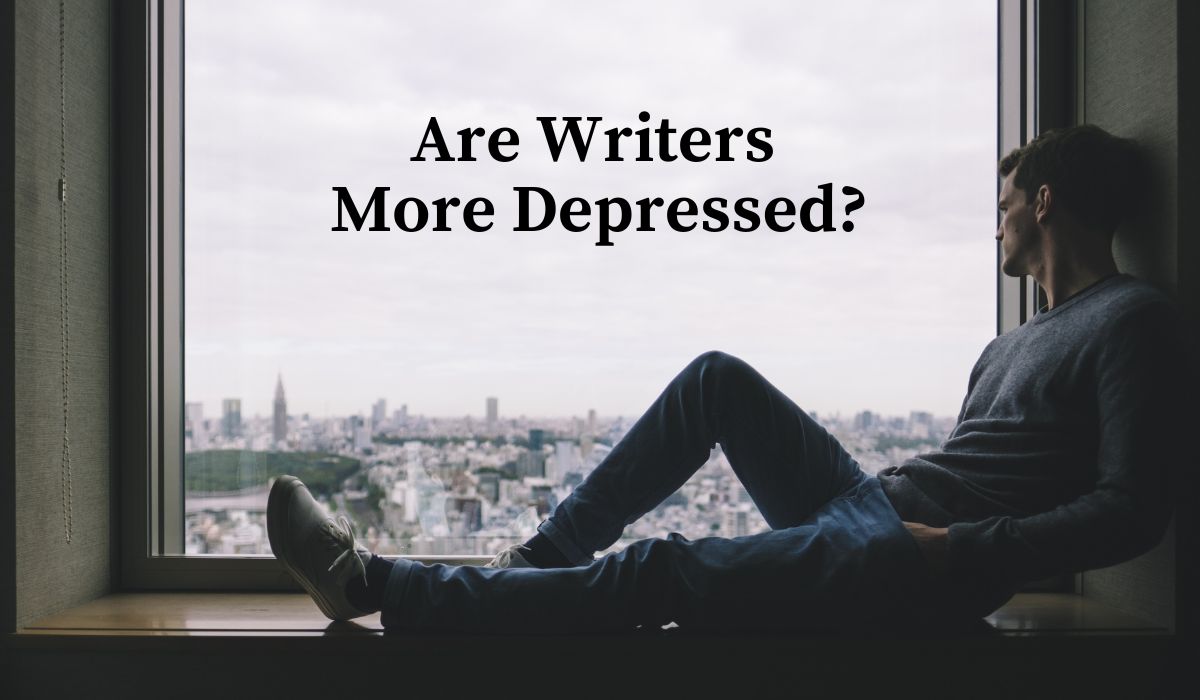Being a writer is often viewed as a dream job, with many people imagining sipping coffee while crafting stories in cozy bookshops or home offices. However, the reality of the writing profession is far more complex. Not only does it require immense dedication, creativity, and persistence, but there are aspects of the career that have been linked to increased depression and anxiety.
While writing itself is not inherently harmful, the nature of the work can contribute to emotional struggles, such as the constant exposure to depressing news, adopting sedentary habits, and immersing oneself in the minds of troubled characters.
As a writer myself, I’ve certainly succumbed to down feelings either from too much self-reflection (when writing nonfiction, especially memoir), too much exposure to chaotic current affairs, and also from getting a little too well-acquainted with mentally unstable fictional characters! It wasn’t until I went through my creative writing degree program that I also noticed a trend of what seemed like emotional distress from a number of my writer counterparts that caused me to ponder potential factors surrounding the practice of consistent writing that might contribute to the more melancholy tendencies writers experience.
In this article, we’ll explore the unique challenges faced by writers that might contribute to an inclination toward depression and anxiety, plus ways we can protect our mental health.
Are Writers Really at Risk for Depression?
I couldn’t find any recent research that directly pointed to writers being at a greater risk for depression except for a 2010 article published by The Guardian, which cited a survey from Health.com that pointed to the career of writing as being at high risk. Even from these articles, I quickly concluded that it’s not the writing that can contribute to depression, but one’s writing practices that do.
For example, it’s common knowledge that writers are highly sedentary beings because we use laptops or notebooks to write. Additionally, we spend a lot of time sitting still while researching our writing by reading books or articles. Tons of literature has been published online that attributes a sedentary lifestyle to depression and anxiety.
Here is a list of common writing practices that are actually causing us writers to feel down at times.
Constant Exposure to Current Events
As a writer, staying informed about current events is essential. Writers often need to understand and reflect on contemporary issues in their work, whether they are reporting on news stories or weaving these events into their fiction. However, consuming a steady diet of news can take its toll on one’s mental well-being.
Overexposure to negative news, such as stories about war, crime, and natural disasters, can lead to feelings of helplessness, anxiety, and depression. This phenomenon is known as ‘headline stress disorder,’ and it has become increasingly common in the digital age, where a constant stream of distressing stories is just a click away. For writers, this stress can be amplified, as they not only consume the news but often have to engage with it more deeply in their work.
Writers Live Sedentary Lifestyles
Writing is a predominantly sedentary profession. While creativity and mental agility are crucial, the physical act of writing typically involves long hours of sitting still. Recent research indicates that individuals who sit for more than six hours per day have a higher risk of developing depression than those who are more active. Prolonged sitting has also been linked to obesity, cardiovascular disease, and a host of other health issues.
Writers may struggle to maintain a healthy balance between work and physical activity, especially when faced with tight deadlines or creative challenges. A sedentary lifestyle can exacerbate feelings of depression and make it more difficult for a writer to manage their mental health.
Embodying Characters with Mental and Emotional Instabilities
Writers often delve deep into the minds of their characters, sometimes exploring dark and complex emotions. While this level of empathy can enrich a writer’s work, it can also take a psychological toll. Performers who practice method acting have been known to experience emotional distress by embodying their characters as well. “Method acting is a technique that performers employ to empathize with the characters they are portraying emotionally. In this technique, the actor ‘becomes’ the character and frequently remains in the role for long periods,” according to Nashville Film Institute. There’s no doubt that artists who engage with the suffering of their subjects may be more prone to depression and other mental health issues.
This phenomenon, known as ‘emotional contagion,’ refers to the process by which a person can ‘catch’ the emotions of others, even fictional characters. For writers, this means that spending hours each day exploring the inner worlds of characters dealing with trauma, grief, or mental illness can lead to a heightened vulnerability to depression.
Writers Drink a Lot of Caffeine
Writers are often known to rely heavily on caffeine to fuel their creative processes. The stimulant effects of caffeine can provide a quick boost of energy, alertness, and focus, which are all desirable qualities for writers trying to meet deadlines or overcome writer’s block. However, excessive caffeine consumption can have negative effects on mental health, such as anxiety and depression. Caffeine increases the release of stress hormones like cortisol and adrenaline, which can trigger the “fight or flight” response and lead to feelings of nervousness and tension. Moreover, the overconsumption of caffeine can disrupt sleep patterns, leading to fatigue, irritability, and decreased concentration, which can also contribute to anxiety and depression. While moderate caffeine intake can be beneficial, writers should be mindful of their caffeine consumption and consider other strategies, such as exercise or meditation, to manage stress and maintain their mental well-being.
Protecting Your Mental Health as a Writer
Given the unique challenges writers face, it is essential for us to prioritize our mental well-being. Here are some strategies that can help:
Limit Exposure to Negative News
While it’s crucial for writers to stay informed, setting boundaries around news consumption can help protect against the negative effects of headline stress disorder. Consider allocating specific times of day for checking the news and avoid consuming it during leisure time or before bed. Additionally, make an effort to seek out positive news stories to balance the negative ones.
Prioritize Physical Activity
Incorporate regular exercise into your routine to counteract the sedentary nature of writing. Aim to partake in physical activity for at least 30 minutes to an hour each day. This can take the form of going on a long walk, riding a bike, or catching a workout in the gym or at home. There are tons of YouTube videos now that can guide you through how to workout at home using free weights or no weights at all!
Engage in Mindfulness and Meditation Practices
Incorporate mindfulness and meditation practices into your daily routine to promote mental well-being. Techniques such as deep breathing, progressive muscle relaxation, and guided imagery can help reduce stress, improve focus, and enhance emotional resilience. Meditation can also foster self-awareness, which may help writers become more attuned to their own emotional states and prevent emotional contagion from affecting them as intensely.
Limit Your Caffeine Intake
Limiting caffeine intake can be beneficial for those looking to reduce anxiety and improve overall health. One effective way to limit caffeine intake is to gradually decrease the amount consumed over time. This can be achieved by gradually substituting caffeinated drinks with decaffeinated versions, reducing the number of cups consumed per day, or decreasing the strength of the coffee or tea. Another approach is to switch to herbal teas or other non-caffeinated beverages like water or juice. It’s also important to be mindful of hidden sources of caffeine, such as chocolate, energy drinks, and some medications. Reading labels carefully can help in identifying products that contain caffeine. Getting enough sleep and staying hydrated can reduce the need for caffeine and improve overall health.
Diversify Your Writing Projects
To counteract the potentially draining effects of delving into the minds of troubled characters, consider diversifying your creative projects. Balance darker, more emotionally intense work with lighter, uplifting stories or explore different genres and writing styles. By varying your writing projects, you can help maintain a healthy emotional equilibrium and reduce the risk of emotional contagion.
Seek Professional Help When Necessary
It’s crucial for writers to recognize when their mental health may be at risk and seek professional help when necessary. If feelings of depression, anxiety, or other emotional challenges persist or worsen, consulting a mental health professional can provide the guidance and support needed to navigate these challenges. Early intervention can make a significant difference in addressing mental health issues.

Mel Beasley has a bachelor’s in creative writing and journalism from the University of North Carolina at Wilmington. He brings 9+ years of digital marketing and writing experience to the table by writing for publications such as Lumina News and Encore Magazine. He spent 2 years as a college-level writing tutor, and is a certified writing tutor through the CRLA, which is a prestigious cert recognized by the Association for the Coaching & Tutoring Profession. He is a professional SEO blogger with experience writing for brands such as Boardworks Education and The Greater Wilmington Business Journal. One of his latest website and marketing projects has been building the website for the now New York Times Bestselling author, Nina de Gramont.








